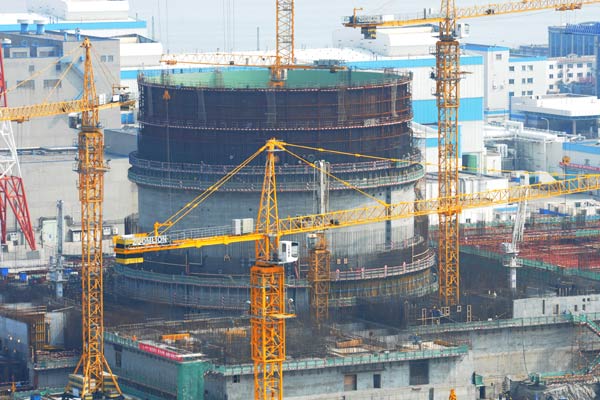 |
|
The second phase of the Tianwan Nuclear Power Station near Lianyungang, Jiangsu province. Experts said China has become a global infrastructure expert by building on the experience and project management skills acquired from years of working in developing nations. GENG YUHE/CHINA DAILY |
China has become a global infrastructure expert by building on the experience and project management skills acquired from years of working in developing nations, according to Simon Taylor, professor and director of the Master of Finance program at the University of Cambridge's Judge Business School.
Now it may become a major infrastructure investor in developed economies, a shift that is starting to happen but one that Taylor said may really take off because of a particular project.
That project is the construction of two nuclear reactors at Hinkley Point C in Somerset, the United Kingdom, led by energy group Electricite de France SA.
State-owned nuclear giants China General Nuclear Power Group and China National Nuclear Corp are discussing an estimated 35 percent equity stake in a project that could end up costing around 24 billion pounds ($37.5 billion).
"If it (the Hinkley Point project) can be made to work, it will be a powerful indicator of China's willingness and ability to get involved with even the most complex projects in rich countries," said Taylor, who specializes in the economics and financing of energy infrastructure.
Apart from capital, Taylor said the project management expertise Chinese companies bring to the table and EDF's longstanding relationship with China, including a joint venture with CGN to build two reactors at the Taishan nuclear power plant in Guangdong province, could help seal the deal.
"The deal is being negotiated as we speak. It is probable-but not definite-that there will be a deal agreed on early next year, with construction starting sometime in 2015," said Taylor.
The deal would be China's first nuclear deal in the developed world. But Chinese investors have been active in nuclear cooperation in developing countries, including an agreement to construct a reactor at Argentina's Atucha plant signed earlier this year.
There are two potential gains from Hinkley Point C.
First, Chinese companies will have the unique opportunity to get into the European country with an expansive nuclear program, which can translate into greater involvement in the future.
"What they ultimately want to do is to bring Chinese-built reactors to the United Kingdom, for example CGN's CPR-1000," said Taylor.
Hinkley Point C is due to be built with French technology by France's government-controlled company Areva SA. It is expected to come online in 2023, and would feature the first reactors built in the UK for more than 20 years. The government aims to use more nuclear power to cut carbon emissions by 2050.
Second and more significantly, the Hinkley project can be viewed as a "test case" for Chinese infrastructure investment in developed nations, according to Taylor.
The UK, with its well-developed legal system of contracts and openness to foreign investment, fits well with the risk appetite of Chinese companies, Taylor said.
China will invest 105 billion pounds in UK infrastructure by 2025, according to a report by the London-based Center for Economics and Business Research and the law firm Pinsent Masons LLP.
Other developed economies such as the United States, which also need investment in their infrastructure, are historically less open to foreign investment in that area, said Taylor.
"If Hinkley Point C does go ahead, it will be a landmark in China's infrastructure investment abroad," said Taylor. "It would be starting with the most difficult case that is extremely long-term, technologically complex and controversial because it is nuclear."
If Chinese companies can handle a project like that, they will have the confidence and experience to undertake other infrastructure projects in the UK and beyond.
In turn, other developed nations may be more open to Chinese infrastructure investment.
